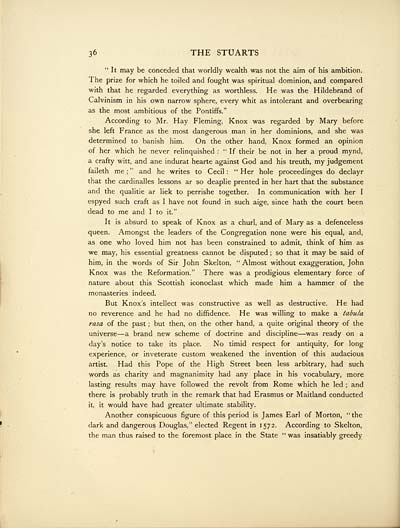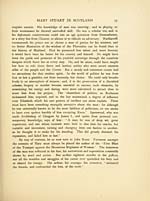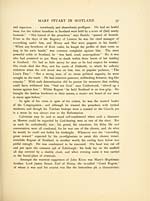Stuarts
(60) Page 36
Download files
Complete book:
Individual page:
Thumbnail gallery: Grid view | List view

36 THE STUARTS
" It may be conceded that worldly wealth was not the aim of his ambition.
The prize for which he toiled and fought was spiritual dominion, and compared
with that he regarded everything as worthless. He was the Hildebrand of
Calvinism in his own narrow sphere, every whit as intolerant and overbearing
as the most ambitious of the Pontiffs."
According to Mr. Hay Fleming, Knox was regarded by Mary before
she left France as the most dangerous man in her dominions, and she was
determined to banish him. On the other hand, Knox formed an opinion
of her which he never relinquished : "If their be not in her a proud mynd,
a crafty witt, and ane indurat hearte against God and his treuth, my judgement
faileth me ; " and he writes to Cecil : " Her hole proceedinges do declayr
that the cardinalles lessons ar so deaplie prented in her hart that the substance
and the qualitie ar liek to perrishe together. In communication with her I
espyed such craft as I have not found in such aige, since hath the court been
dead to me and I to it."
It is absurd to speak of Knox as a churl, and of Mary as a defenceless
queen. Amongst the leaders of the Congregation none were his equal, and,
as one who loved him not has been constrained to admit, think of him as
we may, his essential greatness cannot be disputed ; so that it may be said of
him, in the words of Sir John Skelton, " Almost without exaggeration, John
Knox was the Reformation." There was a prodigious elementary force of
nature about this Scottish iconoclast which made him a hammer of the
monasteries indeed.
But Knox's intellect was constructive as well as destructive. He had
no reverence and he had no diffidence. He was willing to make a tabula
rasa of the past ; but then, on the other hand, a quite original theory of the
universe — a brand new scheme of doctrine and discipline — was ready on a
day's notice to take its place. No timid respect for antiquity, for long
experience, or inveterate custom weakened the invention of this audacious
artist. Had this Pope of the High Street been less arbitrary, had such
words as charity and magnanimity had any place in his vocabulary, more
lasting results may have followed the revolt from Rome which he led ; and
there is probably truth in the remark that had Erasmus or Maitland conducted
it, it would have had greater ultimate stability.
Another conspicuous figure of this period is James Earl of Morton, " the
dark and dangerous Douglas," elected Regent in 1572. According to Skelton,
the man thus raised to the foremost place in the State " was insatiably greedy
" It may be conceded that worldly wealth was not the aim of his ambition.
The prize for which he toiled and fought was spiritual dominion, and compared
with that he regarded everything as worthless. He was the Hildebrand of
Calvinism in his own narrow sphere, every whit as intolerant and overbearing
as the most ambitious of the Pontiffs."
According to Mr. Hay Fleming, Knox was regarded by Mary before
she left France as the most dangerous man in her dominions, and she was
determined to banish him. On the other hand, Knox formed an opinion
of her which he never relinquished : "If their be not in her a proud mynd,
a crafty witt, and ane indurat hearte against God and his treuth, my judgement
faileth me ; " and he writes to Cecil : " Her hole proceedinges do declayr
that the cardinalles lessons ar so deaplie prented in her hart that the substance
and the qualitie ar liek to perrishe together. In communication with her I
espyed such craft as I have not found in such aige, since hath the court been
dead to me and I to it."
It is absurd to speak of Knox as a churl, and of Mary as a defenceless
queen. Amongst the leaders of the Congregation none were his equal, and,
as one who loved him not has been constrained to admit, think of him as
we may, his essential greatness cannot be disputed ; so that it may be said of
him, in the words of Sir John Skelton, " Almost without exaggeration, John
Knox was the Reformation." There was a prodigious elementary force of
nature about this Scottish iconoclast which made him a hammer of the
monasteries indeed.
But Knox's intellect was constructive as well as destructive. He had
no reverence and he had no diffidence. He was willing to make a tabula
rasa of the past ; but then, on the other hand, a quite original theory of the
universe — a brand new scheme of doctrine and discipline — was ready on a
day's notice to take its place. No timid respect for antiquity, for long
experience, or inveterate custom weakened the invention of this audacious
artist. Had this Pope of the High Street been less arbitrary, had such
words as charity and magnanimity had any place in his vocabulary, more
lasting results may have followed the revolt from Rome which he led ; and
there is probably truth in the remark that had Erasmus or Maitland conducted
it, it would have had greater ultimate stability.
Another conspicuous figure of this period is James Earl of Morton, " the
dark and dangerous Douglas," elected Regent in 1572. According to Skelton,
the man thus raised to the foremost place in the State " was insatiably greedy
Set display mode to:
![]() Universal Viewer |
Universal Viewer | ![]() Mirador |
Large image | Transcription
Mirador |
Large image | Transcription
Images and transcriptions on this page, including medium image downloads, may be used under the Creative Commons Attribution 4.0 International Licence unless otherwise stated. ![]()
| Histories of Scottish families > Stuarts > (60) Page 36 |
|---|
| Permanent URL | https://digital.nls.uk/95239771 |
|---|
| Description | A selection of almost 400 printed items relating to the history of Scottish families, mostly dating from the 19th and early 20th centuries. Includes memoirs, genealogies and clan histories, with a few produced by emigrant families. The earliest family history goes back to AD 916. |
|---|

